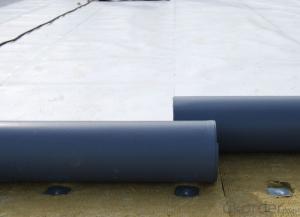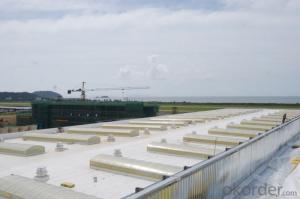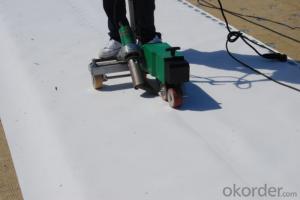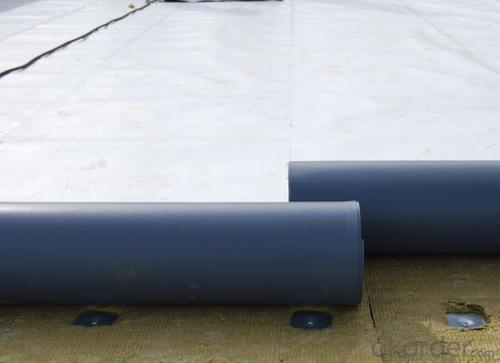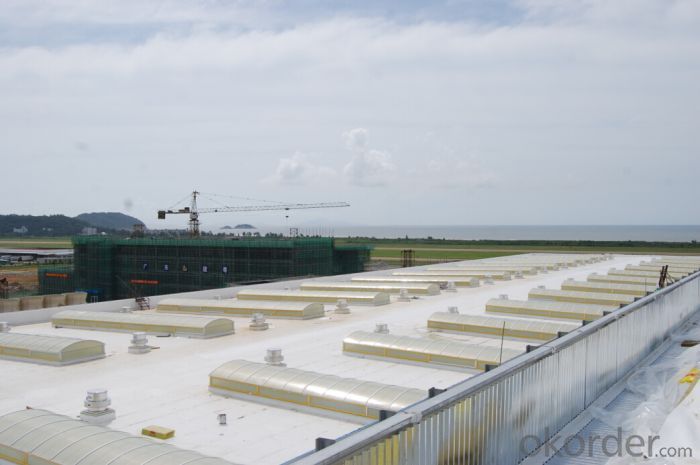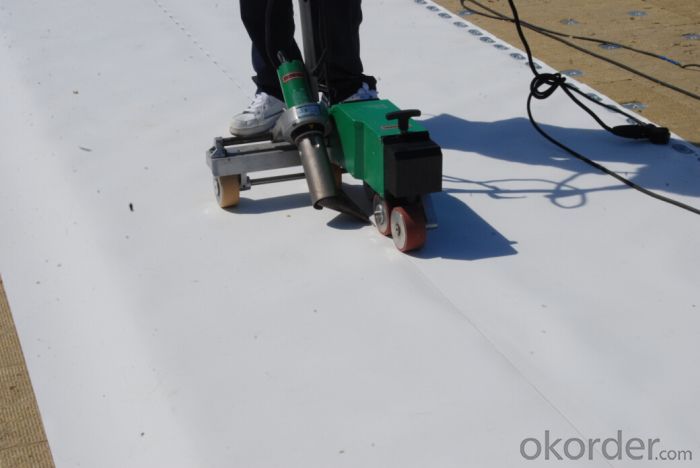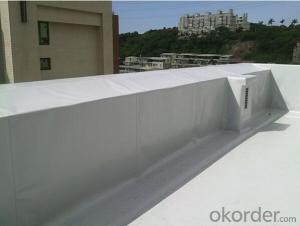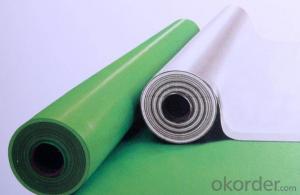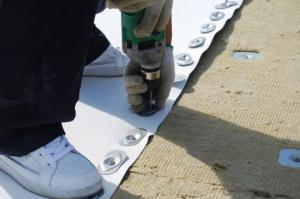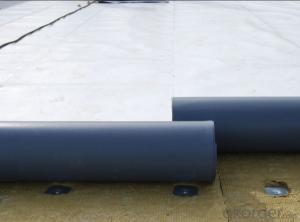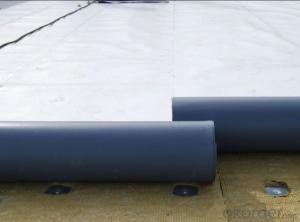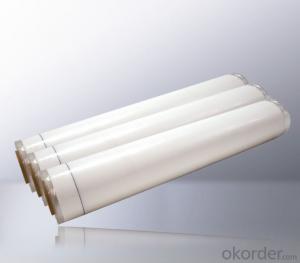TPO Waterproof Roofing Membrane Thickness with 1.2 mm
- Loading Port:
- Qingdao
- Payment Terms:
- TT OR LC
- Min Order Qty:
- 5000 m²
- Supply Capability:
- 10000 m²/month
OKorder Service Pledge
OKorder Financial Service
You Might Also Like
Product Description:
Description Of TPO membrane:
Tpo waterproof roofing membrane for sale
1.high breathable membrane
2.market:all over the world
3.resonable price
Main Features of TPO membrane:
- Easy installation with good system integrity, need few accessories
- High tensile and tear strength, puncture resistance
- No plasticizer, heat aging and UV resistance, durable
- Hot-air welding, rapid welding speed, high peel strength (two times of PVC)
-No chlorine, 100% recyclable, environment friendly
- Durable hot-air welding performance and convenient maintainance
- Smooth surface, unfading and stain resistance
Product Advantages:
1. Weather resistance and durability; Excellent weld ability;
2. No any crisp agents to prevent materials brittleness;
3. Intermediate enhanced polyester mesh fabric to have high tensile strength, fatigue resistance and penetrating resistance suitable for mechanically attached roofing systems;
4. Excellent the same high and low temperature resistance as rubber materials which can keep flexible at -50° C and keep mechanical strength in high temperature;
FAQ:
1. What are we supplying?
We are specialized in producing Colorful Asphalt Roof Shingle, SBS/APP modified bitumen waterproof membrane, Self adhesive bitumen waterproof membrane, PVC waterproofing membrane, EPDM rubber roofing membrane, Single Component Polyurethane Waterproof Coating, and Spray Polyurea Waterproof Coating.
2. How Many years experience do we have?
We have been exported to more than 20 countries in the past 15 years.
3. How long do we usually reply your request?
We always reply our customer within 24 hours.
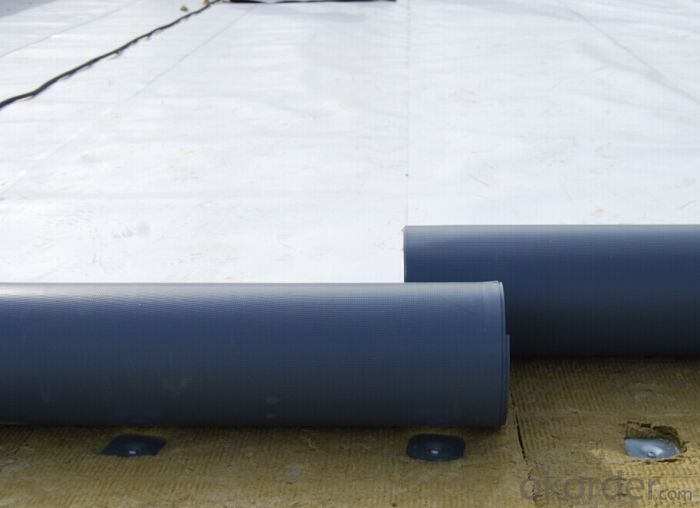
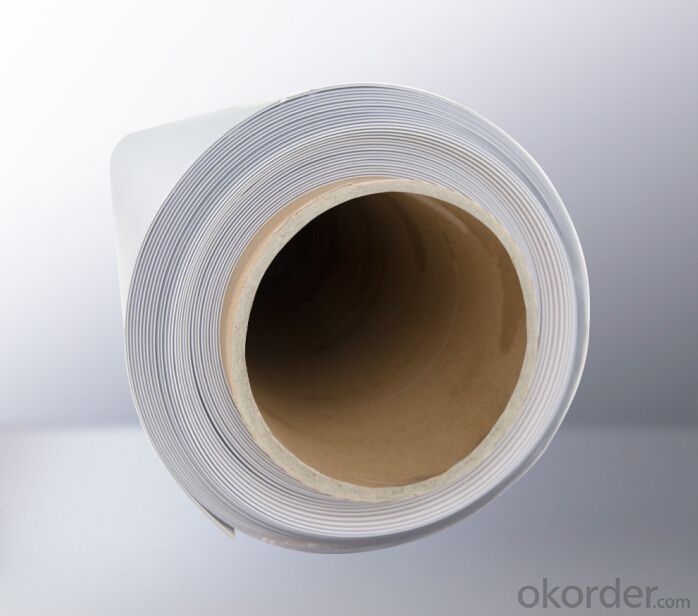
- Q: Are waterproofing membranes suitable for crawl spaces?
- Yes, waterproofing membranes are suitable for crawl spaces as they provide a protective barrier against moisture and water intrusion, preventing issues such as mold growth, structural damage, and musty odors.
- Q: Can a waterproofing membrane be used in areas with high foot traffic or heavy loads?
- Yes, a waterproofing membrane can be used in areas with high foot traffic or heavy loads. Waterproofing membranes are designed to provide durability and protect the underlying structures from water damage. They are often used in areas such as basements, balconies, and rooftops, which may experience heavy foot traffic or support heavy loads. However, it is important to choose a membrane specifically designed for high traffic or heavy load areas to ensure it can withstand the intended use.
- Q: Can waterproofing membranes be used on concrete fountains?
- Concrete fountains, which are frequently subjected to water and susceptible to leaks and moisture damage, can benefit from the application of waterproofing membranes. These membranes serve as a barrier that prevents water penetration and safeguards the structure of the fountain. Designed to be flexible, durable, and resistant to water, waterproofing membranes provide an optimal solution for concrete fountains. They can be applied to both the interior and exterior surfaces of the fountain, ensuring comprehensive protection against water damage. By utilizing waterproofing membranes, the lifespan of the concrete fountain can be prolonged, and maintenance expenses can be minimized.
- Q: Does a waterproofing membrane require any specific cleaning methods?
- Specific cleaning methods are required for a waterproofing membrane. To maintain its effectiveness and longevity, regular cleaning is important. The type of membrane being used will determine the specific cleaning methods, as different materials may have different requirements. It is generally advised to use gentle cleaning solutions and tools, such as a soft brush and mild detergent, to clean the membrane. Avoiding harsh chemicals or abrasive materials that could cause damage is crucial. Furthermore, regularly inspecting the membrane for signs of damage or debris buildup is essential. Addressing these issues promptly can prevent further damage and ensure continued effective waterproofing. It is highly recommended to consult the manufacturer's guidelines and recommendations for proper care and maintenance of the waterproofing membrane.
- Q: Are there any specific tools or equipment required for installing a waterproofing membrane?
- Yes, there are specific tools and equipment required for installing a waterproofing membrane. Some of the essential tools and equipment include: 1. Protective gear: This includes gloves, goggles, and a face mask to protect yourself from any harmful chemicals or fumes. 2. Cleaning equipment: Before installing the membrane, the surface needs to be clean and free from any dust, debris, or loose particles. Therefore, you may need a broom, vacuum cleaner, or pressure washer to clean the area properly. 3. Waterproofing membrane: The specific type of membrane will depend on the project requirements, but it is essential to have the appropriate membrane material and enough coverage to ensure a proper seal. 4. Primer: In some cases, a primer may be needed to enhance adhesion between the surface and the membrane. The primer type will depend on the surface material and the membrane being used. 5. Application tools: These tools are used to apply the membrane onto the surface. Common tools include brushes, rollers, or sprayers. The choice will depend on the type of membrane and the size of the project. 6. Seam tape: If the waterproofing membrane requires seams, a seam tape will be needed to ensure a watertight seal at the joints. The tape should be compatible with the membrane material. 7. Adhesive or adhesive tape: Some waterproofing membranes require an adhesive to bond them to the surface. Alternatively, adhesive tape can be used for self-adhesive membranes. 8. Cutting tools: Depending on the shape and size of the area to be waterproofed, you may need cutting tools such as utility knives or scissors to trim the membrane to the desired size and shape. 9. Caulking gun: A caulking gun is necessary for applying sealant or caulk to fill any gaps or cracks in the surface before installing the membrane. 10. Drying equipment: After the membrane is installed, it may require a certain amount of time to dry or cure. Fans or dehumidifiers may be needed to accelerate the drying process, depending on the specific membrane and environmental conditions. It is important to consult the manufacturer's guidelines or seek professional advice to ensure you have all the necessary tools and equipment for a successful installation of the waterproofing membrane.
- Q: Can a waterproofing membrane be used on precast metal surfaces?
- Yes, a waterproofing membrane can be used on precast metal surfaces. The membrane acts as a protective barrier, preventing water from seeping through the metal and causing damage. It helps to maintain the integrity and longevity of the precast metal surfaces by keeping them dry and free from moisture-related issues.
- Q: Can a waterproofing membrane be used in residential construction?
- Yes, a waterproofing membrane can be used in residential construction. Waterproofing membranes are commonly used in various areas of a residential property, such as roofs, basements, bathrooms, and foundations. These membranes are designed to prevent water penetration and protect the structure from moisture-related damages. By installing a waterproofing membrane, homeowners can ensure that their property remains dry and free from water leaks, which can lead to mold growth, structural deterioration, and other costly issues. There are various types of waterproofing membranes available in the market, including sheet membranes, liquid membranes, and self-adhering membranes, each with its own advantages and suitability for specific applications. Consulting with a professional contractor or architect can help determine the most appropriate waterproofing membrane for a particular residential construction project.
- Q: Are waterproofing membranes resistant to efflorescence?
- In general, waterproofing membranes have a resistance to efflorescence. This refers to the white residue that can be seen on the surface of materials like concrete, brick, or stone when salts migrate to the surface. The purpose of waterproofing membranes is to form a barrier that blocks water and moisture from entering the material and carrying salts to the surface. By effectively preventing water from entering, waterproofing membranes reduce the occurrence of efflorescence and provide long-lasting protection against it. However, it is important to consider that the effectiveness of a waterproofing membrane in preventing efflorescence can vary depending on factors such as the quality and application of the membrane, environmental conditions, and the presence of underlying issues like water infiltration or inadequate drainage.
- Q: Can a waterproofing membrane be used for dams?
- Yes, a waterproofing membrane can be used for dams. These membranes are designed to prevent water leakage by creating a barrier that is resistant to water penetration. They can be applied to the surface of the dam to ensure its integrity and prevent seepage of water through the structure.
- Q: Can waterproofing membranes be used on concrete reservoirs?
- Yes, waterproofing membranes can be used on concrete reservoirs. These membranes provide a protective barrier against water infiltration, ensuring that the reservoir remains watertight and preventing any potential leaks or damage to the concrete structure. Waterproofing membranes are commonly used in construction to enhance the durability and longevity of concrete reservoirs.
Send your message to us
TPO Waterproof Roofing Membrane Thickness with 1.2 mm
- Loading Port:
- Qingdao
- Payment Terms:
- TT OR LC
- Min Order Qty:
- 5000 m²
- Supply Capability:
- 10000 m²/month
OKorder Service Pledge
OKorder Financial Service
Similar products
Hot products
Hot Searches
Related keywords
